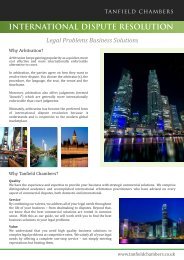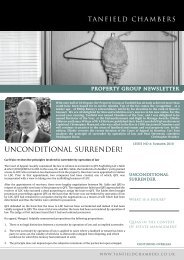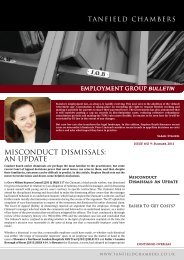Inside: Bankruptcy and Ancillary Relief - Tanfield Chambers
Inside: Bankruptcy and Ancillary Relief - Tanfield Chambers
Inside: Bankruptcy and Ancillary Relief - Tanfield Chambers
You also want an ePaper? Increase the reach of your titles
YUMPU automatically turns print PDFs into web optimized ePapers that Google loves.
Welcome to the Autumn edition of <strong>Tanfield</strong> <strong>Chambers</strong>’ Family<br />
Matters. Since our last issue we have finalised the detail of our<br />
popular CPD Crammer Day, details of which you will find on the<br />
back of this newsletter. Please book soon to avoid disappointment!<br />
This issue takes on a financial flavour, with articles covering <strong>Bankruptcy</strong><br />
in <strong>Ancillary</strong> <strong>Relief</strong> <strong>and</strong> Michael Bailey’s thoughts on the implications of<br />
Stack v Dowden, both tasters of topics which will be covered on the<br />
Crammer day.<br />
On a different topic, Laura Scott provides a helpful précis of the changes<br />
to the law surrounding non-molestation orders post 1 July 2007.<br />
As ever, we welcome your feedback <strong>and</strong> suggestions on this publication<br />
<strong>and</strong> our events programme, <strong>and</strong> hope you find Family Matters an<br />
interesting read.<br />
Dick Pears<br />
Autumn 2007<br />
<strong>Inside</strong>:<br />
<strong>Bankruptcy</strong> <strong>and</strong><br />
<strong>Ancillary</strong> <strong>Relief</strong> Cover/p2<br />
Stack v Dowden<br />
The Death of Resulting Trusts?<br />
p2/3<br />
S42A Family Law Act<br />
1996<br />
p3<br />
Diary Dates<br />
<strong>Bankruptcy</strong> <strong>and</strong> <strong>Ancillary</strong> <strong>Relief</strong><br />
Three recent cases have significant implications for the former spouse or civil partner<br />
of a bankrupt. In Hill <strong>and</strong> Bangham v Haines [2007] EWHC 1012 (Ch) HHJ Pelling<br />
(sitting as a HCJ) held that a property transfer order made in <strong>Ancillary</strong> <strong>Relief</strong> (AR)<br />
was potentially susceptible to an attack by the trustee in bankruptcy (TiB) of the transferor<br />
as a transfer at an undervalue. This was so whether the order was made by consent or<br />
after a contested hearing.<br />
S339 Insolvency Act 1986 (IA) means that a trustee can apply to set aside a transaction<br />
whereby one spouse transfers his interest in matrimonial property to the other spouse in<br />
the absence of adequate consideration. The dismissal of W’s other claims could not<br />
amount to the necessary consideration since an application for AR was not a cause of<br />
action <strong>and</strong> could not be resolved by binding contract (see Xydhias [1999] 2 All ER 386).<br />
The provisions of s339 provide that a transaction whereby the value of the consideration<br />
given ‘in money or money's worth, is significantly less than the value, in money or money's<br />
worth’ of the property transferred that is a transaction at an undervalue <strong>and</strong> vulnerable to<br />
being set aside, notwithst<strong>and</strong>ing the fact that such transaction is authorised by the court<br />
pursuant to the MCA 1973.<br />
The ratio expressly excludes cases where each party has been ordered to transfer assets<br />
to the other of substantially equivalent values, but the logic of the decision suggests that<br />
any exchange of property pursuant to the MCA is simply not good consideration.<br />
Then came Segal v Pasram <strong>and</strong> Pasram [2007] Ch D (R Knowles QC) (7 Jun 07) where<br />
the court relied on Hill <strong>and</strong> Stack v Dowden [2005] EWCA Civ 857, [2006] 1 FLR 254 to<br />
TC<br />
T A N F I E L D C H A M B E R S<br />
p4<br />
1
Family Matters<br />
2<br />
dispose of the attempt to circumvent the TiB’s<br />
entitlement by way of a deed whereby W<br />
purported to give up all her claims for AR along<br />
with £1,000 to H in consideration for H’s share of<br />
the matrimonial property being transferred to her.<br />
In accordance with Hill <strong>and</strong> Xydhias, this was not<br />
consideration pursuant to a legally binding<br />
contract, even though it was executed by deed.<br />
In Avis v Turner <strong>and</strong> Anor [2007] EWCA Civ 748<br />
the Court of Appeal held that a TiB could apply<br />
for an order for sale in a case where jointly<br />
owned property was retained for the use of W.<br />
The property was held on a trust for sale, sale<br />
being postponed until the usual trigger events.<br />
The Court held that since it would have had<br />
jurisdiction to entertain an application from H<br />
pursuant to s14 ToLATA 1996 notwithst<strong>and</strong>ing<br />
the absence of a trigger event, the TiB inherited<br />
the right to make a similar application along with<br />
H‘s estate. However whereas any application<br />
made by the husb<strong>and</strong> for an order for sale might<br />
have been very likely to have been refused, the<br />
TiB is assisted by s335A IA 1986 which provides<br />
that the interests of the bankrupt's creditors<br />
outweigh all other considerations unless the<br />
circumstances of the case are exceptional. This<br />
places the spouse remaining in the FMH in a<br />
vulnerable position as it will be very difficult to<br />
show exceptional circumstances. The W in this<br />
case was unable to rely on s283A of the IA which<br />
was enacted by the Enterprise Act 2002 <strong>and</strong><br />
which provides that at the end of the period of<br />
three years beginning with the date of<br />
bankruptcy, any interest of the bankrupt in a<br />
dwelling house which, at the date of bankruptcy<br />
was the sole or principal residence of the<br />
bankrupt's spouse ceases to be comprised in the<br />
bankrupt's estate. That provision is subject to<br />
transitional provisions <strong>and</strong> will assist spouses in<br />
cases where the bankruptcy post dates 1 April<br />
2004. However, there are likely to still be live<br />
cases where an estate vested in the TiB prior to<br />
that date, <strong>and</strong> increasingly where the TiB makes<br />
an application for sale within the three year<br />
period.<br />
If five years elapses prior to the presentation of a<br />
successful divorce petition the wife will be safe<br />
from applications to set aside for transfer at an<br />
undervalue. Similarly, if a W is not met with an<br />
application from a TiB for an order for sale within<br />
three years after her ex spouses’ bankruptcy she<br />
will be safe from an application of that sort. But<br />
undoubtedly both cases have serious potential<br />
implications for the spouse remaining in the<br />
FMH, <strong>and</strong> demonstrate that there are risks for<br />
that spouse (usually the wife) whether the home<br />
is transferred outright to her, or held in joint<br />
names pending triggers, <strong>and</strong> whether the AR<br />
order is made by consent or not.<br />
Lucy Reed<br />
Call 2002<br />
Lucy has recently written on North v North -<br />
Revisiting Periodical Payments.<br />
Stack v Dowden –<br />
The Death of<br />
Resulting Trusts?<br />
This case was at last an opportunity for the<br />
House of Lords to clarify the correct<br />
interpretation of the law in ToLATA cases.<br />
Were resulting trusts dealt a decisive <strong>and</strong> fatal<br />
blow? Possibly <strong>and</strong> possibly not seems to be the<br />
answer. Or perhaps the answer is to be found in<br />
expected legislation that will put heterosexual<br />
couples on a par with the rest if “financial<br />
hardship” can be shown.<br />
In Stack v Dowden [2005] EWCA (Civ) 857 each<br />
judgment appears almost as a personal<br />
statement from each of the Lords. Lord Hope’s<br />
“golden thread” emerges as a joint property<br />
purchase claim that fails due to unjust<br />
enrichment based on bad faith.<br />
Lord Walker’s gravamen is as to whether the<br />
court can find a real bargain exists between the<br />
parties in the absence of express intention by<br />
looking at whether there is sufficient evidence to<br />
infer or impute a bargain. Academic bias, unjust<br />
enrichment proprietary estoppel, resulting or<br />
constructive trust may be significant but only in<br />
the context of looking at the primary issue of<br />
direct <strong>and</strong> indirect payments to the acquisition of<br />
trust property. Resulting trusts are applicable to<br />
those in an “emotional <strong>and</strong> commercial<br />
relationship” with a quasi contractual flavour, but<br />
in a domestic relationship there will be a heavy<br />
evidential burden to establish an imputed<br />
intention to keep a balance sheet of all<br />
expenditure. A wide view should be taken as to<br />
what contributions are referable to a property’s<br />
acquisition.<br />
Baroness Hale gives the lead judgement: an<br />
TC<br />
T A N F I E L D C H A M B E R S
Family Matters<br />
express declaration of trust is conclusive unless<br />
vitiated by fraud or mistake <strong>and</strong> a severance of a<br />
joint tenancy results in a tenancy at common in<br />
equal shares. The post 1998 TR1 with its three<br />
tick box options (JT, TiC in equal shares, <strong>and</strong><br />
some other trusts), if complied with, will mean the<br />
problem will “eventually disappear”. She<br />
suggests a further tick box : not prepared to<br />
commit at this present time as to size of<br />
beneficial interests. There is a strong onus on a<br />
person seeking to show that the beneficial<br />
interests are otherwise than the way the legal<br />
interest is held. She disapproves the resulting<br />
trust approach in a number of cases <strong>and</strong> gives a<br />
checklist of factors to divining true intention that<br />
are not intended as an exhaustive list. Joint<br />
names was equally consistent with having some<br />
interest in a property: the issue was the size of<br />
that interest in the light of the parties conduct.<br />
Lord Neuberger sets out the case for retention of<br />
the resulting trust in the absence of express<br />
declaration. He suggests a resulting trust plus a<br />
constructive trust or a resulting trust modified by a<br />
constructive trust is the solution: “The property<br />
may be bought in joint names for reasons that cast<br />
no light on the parties’ intentions with regard to<br />
beneficial ownership. It may be the solicitor’s<br />
decision or assumption, the lender’s preference<br />
for the security of two borrowers, or the<br />
happenstance of how the initial contact with the<br />
solicitor was made”.<br />
Lord Neuberger recognises that parties in a<br />
loving relationship are not often anxious to<br />
discuss how they should divide the beneficial<br />
interests in the home they are about to buy. If<br />
they are happy with an equal share of beneficial<br />
interest at the outset they might be expected to<br />
say so.<br />
The conclusion to be drawn from this case is<br />
that, even with an express declaration of trust,<br />
the facts surrounding such an instrument must<br />
be subject to evidential scrutiny along with the<br />
course of financial dealing or conduct between<br />
the parties, in order to ascertain any change in<br />
the parties’ intentions over what could be a<br />
considerable period of time. It is perhaps no<br />
surprise that the Government looks set now to<br />
introduce legislation that would curtail such<br />
excessive litigation.<br />
Michael Bailey<br />
Call 1986<br />
Michael is talking at The Crammer Day on 12 th Oct.<br />
New FLA 1996<br />
Pt IV Provisions<br />
The new provisions for non-molestation<br />
orders finally came into force on 1st July<br />
2007. Section 1 of the Domestic Violence,<br />
Crime <strong>and</strong> Victims Act 2004 creates a new s42A<br />
in the FLA 1996, making the breach of a nonmolestation<br />
order a criminal offence.<br />
Although the new provisions only came in on 1st<br />
July, they apply to non-molestation orders<br />
granted prior to that date where the order<br />
remains in force without a continuing power of<br />
arrest.<br />
For non-molestation applications made after 1st<br />
July, it is no longer possible to achieve a<br />
compromise with undertakings instead of a full<br />
order being made, <strong>and</strong> powers of arrest cannot<br />
be attached to any non-molestation order. The<br />
maximum sentence for breach of a nonmolestation<br />
order is now 5 years imprisonment,<br />
making it an either-way offence allowing for trial<br />
by jury.<br />
Enforcement can still be brought in the civil<br />
courts, <strong>and</strong> the use of warrants of arrest to bring<br />
defendants to court is likely to become more<br />
common. The courts also now have the power to<br />
grant warrants of arrest for breaches of<br />
undertaking (which are still possible instead of<br />
occupation orders). A defendant cannot be<br />
convicted of both the criminal offence of<br />
breaching an order <strong>and</strong> contempt of court, but<br />
there is no bar on parallel proceedings.<br />
The category of associated persons has been<br />
extended to include those who “have or have had<br />
an intimate personal relationship with each other<br />
which is or was of significant duration”, <strong>and</strong><br />
minors can now be subject to non-molestation<br />
orders.<br />
The new orders have much in common with<br />
ASBOs <strong>and</strong> a number of ASBO authorities will<br />
apply in relation to issues such as the st<strong>and</strong>ard<br />
of proof <strong>and</strong> the drafting of orders.<br />
Laura Scott<br />
Call 2001<br />
Laura is talking at The Crammer Day on 12 th Oct.<br />
TC<br />
T A N F I E L D C H A M B E R S<br />
3
Family Matters<br />
4<br />
FAMILY TEAM<br />
AUTUMN DIARY DATES<br />
20 September<br />
Timothy Shuttleworth<br />
Contact with Older Vulnerable<br />
Persons<br />
The evening seminar will attract 1 hour<br />
CPD points <strong>and</strong> will run from 6.00pm to 7.30pm<br />
at <strong>Tanfield</strong> <strong>Chambers</strong> <strong>and</strong> will be followed by<br />
refreshments.<br />
12 October<br />
CPD Crammer Day<br />
including:<br />
Olivia Murphy<br />
Recent Developments <strong>and</strong><br />
Current Issues in <strong>Ancillary</strong><br />
<strong>Relief</strong><br />
Philip Dixon<br />
The Impact of Insolvency <strong>and</strong><br />
Confiscation Orders on<br />
<strong>Ancillary</strong> <strong>Relief</strong> Applications<br />
Laura Scott<br />
Child Law Update<br />
Michael Bailey<br />
Stack v Dowden – The Death of<br />
Resulting Trusts?<br />
This event will be held at <strong>Tanfield</strong> <strong>Chambers</strong>, will<br />
run from 9.30-5.00pm <strong>and</strong> will attract 5 1/2 hours<br />
CPD points.<br />
If you are interested in attending either<br />
event please contact Susan Yacoub or<br />
Debbie Haigh on 0207 421 5300 or at<br />
syacoub@tanfieldchambers.co.uk.<br />
Places are limited.<br />
TANFIELD’S<br />
FAMILY TEAM<br />
Peter Hughes QC 1971<br />
Gavin Merrylees 1964<br />
Timothy Shuttleworth 1971<br />
Philip Conrath 1972<br />
Dick Pears 1975<br />
Kerstin Boyd 1979<br />
William Holl<strong>and</strong> 1982<br />
Sebastian Reid 1982<br />
Philip Dixon 1986<br />
David Sharp 1986<br />
Michael Bailey 1986<br />
John Buck 1987<br />
Sarah Dines 1988<br />
Gerald Wilson 1989<br />
Catriona Maclaren 1993<br />
Robin Powell 1993<br />
Charlotte Jewell 1999<br />
Laura Scott 2001<br />
Olivia Murphy 2001<br />
Lucy Reed 2002<br />
M<strong>and</strong>y Short 2003<br />
Darren Watts 2005<br />
Katherine Harmer 2005<br />
Want to find the right skills <strong>and</strong> experience<br />
to suit your case?<br />
View profiles of the Family Team members at<br />
www.tanfieldchambers.co.uk/areas_fam.php<br />
or speak to the Family Team Clerk<br />
Richard Preston for more information.<br />
<strong>Tanfield</strong> <strong>Chambers</strong><br />
2-5 Warwick Court, London, WC1R 5DJ<br />
t: 0207 421 5300 f: 0207 421 5333<br />
dx: 46 London Chancery Lane<br />
www.tanfieldchambers.co.uk<br />
clerks@tanfieldchambers.co.uk<br />
TC<br />
T A N F I E L D C H A M B E R S



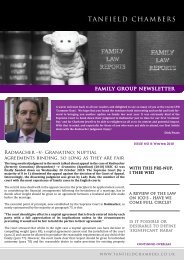


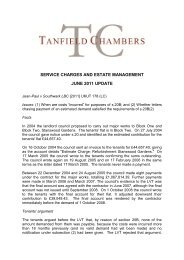
![Re Clarise Properties Ltd [2012] UKUT 4 (LC) - Tanfield Chambers](https://img.yumpu.com/36301708/1/190x245/re-clarise-properties-ltd-2012-ukut-4-lc-tanfield-chambers.jpg?quality=85)



